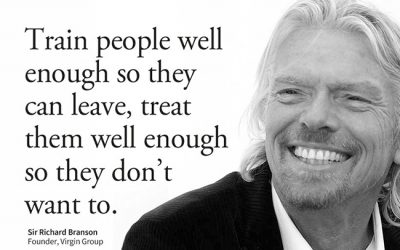In our last blog, we continued the story of Chandra, a young professional woman who had been pushed out of her position of trust at a previous employer. Seeking a fresh start, she took a job with a former supervisor, Wayne, now a senior manager at another location. In this part of the story we look at how Chandra deals with being the new person on the job in a much different work environment.
The first thing that struck Chandra on her first day at the new location was how small it was compared to what she was used to. Her previous job had been at one of the company’s larger locations, always full of people with all their noise, activity and energy. It didn’t take long for Chandra to realize how much she had fed off that energy … and how much she missed it.
Something else she missed was an asset that she left behind: more than a decade of building trust with her colleagues and taking care of customers. She invested a lot of time building that reputation. Her peers trusted her implicitly, her customers loved her, and she even had the ear of at least some of her management. Other than Wayne, the location manager, the people here did not know her. Thought they thought they did…
Chandra learned that, to her new coworkers, the “reason” she left the other location was she “couldn’t get along with the people” over there. Chandra wasn’t sure who started this rumor, though she did feel its sting. Here new colleagues held her at arm’s length for the most part, though a couple did try to pull her into their complaints and schemes. Clearly, these folks thought she was a troublemaker.
Taking time to listen
A few days into her new gig, Chandra was invited to attend a department meeting. Seven people sat around a table in the conference room: Chandra, Wayne, and five colleagues who had clearly been working together for some time. Chandra felt like a fifth wheel. When she tried to speak, others just talked over her. They engaged in a familiar give-and-take conversation that didn’t feel like it had any place in it for Chandra.
Frustrated, and feeling a bit foolish for undervaluing her former colleague’s trust, Chandra tried once more to assert herself. She leaned forward, raised a finger and, just as she was about to speak, she caught Wayne out of the corner of her eye. He locked eyes with Chandra and shook his head once, quickly, raising one finger slightly off the table. Still feeling frustrated – not to mention put off – Chandra gritted her teeth and chose, once again, to be gracious. She would wait … and give Wayne an earful after this meeting.
As the conversation around the table continued, Chandra sat back, watched and listened. The more she observed, the more she realized the easy rapport in the room was really a mask for a dysfunctional system. She identified key personalities and, after a few minutes, could nearly predict what they were about to say.
There was “Mr. Emphatic,” who always had plenty to say, though not much that penetrated beneath the obvious. And there was “Ms. Empathetic,” who eagerly filled in the gaps in these ideas while never really providing solutions. Chandra was also pretty sure Ms. Empathetic was at least a little bit in love with Mr. Emphatic…who was totally in love with himself. There was also “The Contrarian,” who punctuated her sullen silences with sharp criticism, never offering any substance, “Eeyore,” who vacuumed up the Dunkin Munchkins in the center of the table and complained incessantly, and, finally, “Scrooge,” who kept wanting to talk about costs before the ideas were even fleshed out.
The meeting stretched, and the mood in the room began to polarize. Emphatic and Empathetic smiled and chattered. Contrarian scowled. Scrooge fumed, because no one was willing to discuss budgets, and Eeyore excused himself to visit the facilities. Finally, with little accomplished, Wayne called a halt, dismissing everyone except Chandra. Mr. Emphatic nudged her as he walked past, “Teacher’s pet,” he whispered, grinning. Ms. Emphatic glared at Chandra. Wonderful, she thought.
The Challenge
When the others exited the room, Wayne signed, steepling his fingers in a way with which Chandra was familiar. “Thank you for holding back. I trust, by now, you see what I’m dealing with?”
Chandra, honestly, did not, and she admitted as much. “I feel like a fifth wheel over here. At the other location, at least some of the people listened to me. Here, it seems like everyone just wants to listen to themselves.”
“Bingo,” Wayne nodded. “And that’s why I brought you over. This location is taking on water, badly, and if we don’t plug the leaks, this ship will sink. I need someone here who will look past her own nose and see the problem clearly… Someone who will help me get everyone else on board with the solution.”
“And you chose me?”
“And I chose you. Now, I want you to go home and punch up that system you put together for me at the last location. Tweak it for a smaller office, and with the personalities we have here in mind. Present it to me tomorrow morning. If I like it, I want you to work with me to get the others to buy in.”
Chandra left the meeting feeling mixed up. Wayne had given her a clear job, yet her other goals were less clear. How could she earn the trust of people who already believed she was trouble? Especially when they didn’t listen. For the rest of the morning, Chandra pondered this, falling back, again and again, on the one thing she did best: If they wouldn’t listen to her, she would listen to them.
Leaning in by reaching out
Chandra decided to crack the toughest nut first. The one coworker who thought she had more than one reason to be suspicious of her. Chandra walked over to C.J.’s desk. “Hey, where’s a good place to grab lunch?”
C.J. looked up, surprised, before reflexively naming a few restaurants. Chandra smiled, “Would you like to join me for lunch? My treat.” She watched as C.J. studied her face, looking for any hidden agenda. Finally, she agreed. The women chatted over lunch. Chandra shared how she was nervous in her new job and hoping to do well. C.J. admitted she had designs on Matt, and Chandra agreed he was cute, but she wasn’t interested. They talked about hometowns, favorite music and movies and discovered they were both fans of a local band “nobody” else ever heard of.
Back at the office, Chandra knew there was at least one other person she would need to connect with if her plan would be accepted. Scrooge. Clearly, he had some budgetary concerns. Maybe, Chandra thought, they were actually justified. She went by his desk and asked if he had a minute. Once ensconced in a smaller conference room, Chandra chose the direct approach:
“Wayne gave me a complicated project, and there’s one aspect of it that, well, has me concerned. I don’t really have a budget.”
“Scrooge,” whose name turned out to be Ahmed, nodded. “I’m not surprised. Happens a lot around here. And when the money runs out, it all lands on me to ‘find more money.’”
This revelation helped Chandra understand Ahmed a bit more. “Listen, I don’t have to present the project until Friday. Would you mind looking it over before then, help me with the numbers?”
For the first time since she met him, Ahmed smiled. “I’d be delighted.”
Identifying the hidden leader
Chandra went home that night and tweaked her proposal based on the one Wayne approved the last time they worked together. She presented it to Wayne, and they talked about some ways to better acclimate it for the new office. She mentioned her conversations with C.J. and Ahmed. Wayne grinned. “That was smart, though you still have one hurdle.”
“Matt?”
Wayne nodded. The man Chandra thought of as Mr. Emphatic didn’t have an official leadership position, still, as the top salesperson and the most forceful personality in the office, he cut a wide swath and carried a lot of influence.
“Whatever you propose, expect him to have a lot to say about it. Getting his buy-in now will smooth that road for you.”
Chandra thanked Wayne for his suggestion and took her proposal to Matt. “Hey, Wayne tasked me with this proposal, and I wanted to get your thoughts heading into the meeting on Friday.”
Matt grinned. “Sure. Let’s see what you have. Just give me the high points.”
Chandra sketched out her ideas, and Matt listened. When she was finished, Matt astonished her by asking a few fairly intuitive questions. “Thanks,” she said, still a bit surprised.
“No problem … sure … nobody really asks my opinion much, so I’m happy to help.”
Walking away, it hit Chandra. All of Matt’s bravado, his forcefulness might be ego, but it was also his way of feeling important. If no one was going to ask, he would tell them anyway. Huh, she thought.
Friday came and the same group assembled around the table. This time, Wayne introduced Chandra and told the group she was a former colleague he had specifically requested be transferred to their team, and they were all about to see why. Curious, the group leaned in, expectantly.
Chandra began her presentation by thanking the members of the group who offered their suggestions, acknowledging she was new and unsure and very grateful for their perspectives. Soon enough, “Contrarian” and “Eeyore,” spoke up. Chandra responded to their inevitable complaints with a sincere question. The room was silent as they all waited for an answer. Finally, Contrarian responded with a better version of Chandra’s question, which she answered.
As they engaged, Chandra felt a change take place in the room. It wasn’t just her project any more. It was everyone’s project. Soon, the presentation morphed into a workshop, and they all kept going.
Somewhere along the way, someone ordered lunch, and, by closing time, they had an action plan ready to be implemented first thing Monday morning. Chandra couldn’t believe it. Five days ago, she was just the New Girl, silently filling a seat in the conference room. Now, she was officially part of the team.
Reflecting on this later, Chandra realized her way in had been to give the team a win. She had started feeling sorry for herself, yet, when she chose to step outside of that thinking and began listening to others, Chandra learned being the outsider on the team is a choice…not just a circumstance.
Building a Leadership Culture
In previous blogs, especially here, here and here, we’ve talked about what a leadership culture looks like on a team. An active leadership culture is not only an environment in which leadership is embraced and trusted, it is an environment in which the...
4 questions to prepare you for your next big opportunity
In recounting stories of their success, people often say that one opportunity changed the trajectory of their life. We hear it all the time: on awards shows, after sporting events, during graduation speeches. Someone, at some point, was presented with an...
5 questions every employee wants their boss to ask
Recently, Forbes published a list of 10 Things Only Bad Bosses Say. While most of us have ‘bad boss experiences’ in the past, so we may relate, this article got me thinking about some of the things great leaders say to inspire and motivate their teams....
What Richard Branson looks for in a leader
Sometimes, as leaders, we feel pulled in two different directions, do we invest our time and energy in our employees or our customers? While it’s easy to say “both,” the reality is, we have limits on our time, so one or the other is going to get more of...
Creating an environment that encourages people to lead
In our most recent blogs, we looked at two different real-world customer service scenarios. In one story, both an employee and a manager fumbled a simple service opportunity that nearly cost them a long-time customer. In the next story, one employee chose...
A leader steps up and saves the deal
In our last blog, I shared a friend’s story of what he called “bewilderingly poor customer service,” that left him wondering why neither the employee nor the manager seemed to know how to fix the problem … or felt empowered to do so. Today’s story begins...








0 Comments